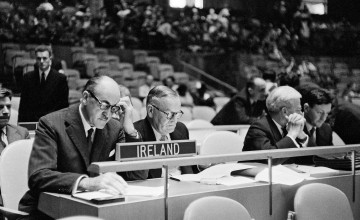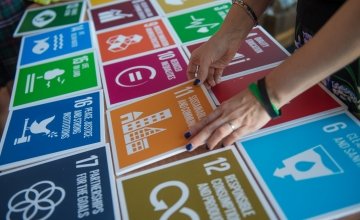
Read our 2024 annual report

Knowledge Hub
Ireland’s Call: an opportunity to lead as a champion of the SDGs
As Ireland progresses towards achieving Agenda 2030, we must call upon our past and our vision for the future to lead as champions of the Sustainable Development Goals (SDGs) on an international stage.

Geographically, we are at the periphery of Europe, but I don't see Ireland in that way…The way I see us is as an island at the centre of the world.
Ireland’s role in forging a better future
Last week, while attending the annual UN Forum on progress towards the Sustainable Development Goals, I had the opportunity to join an event to mark the retirement of a senior Irish diplomat, David Donohue. David isn’t a household name in Ireland but he should be, indeed he should be known around the world for the role he played in forging a truly global consensus on the path towards a better, more sustainable future.
In 2015, along with his Kenyan counterpart, Macharia Kamau, David headed-up the Irish delegation that co-facilitated the negotiation of ‘Agenda 2030: The Sustainable Development Goals’ – the landmark multi-lateral agreement that sets the course for sustainable development across the world leading up to 2030. It was a long and arduous process involving extensive consultation and intense negotiation, but the outcome document is an achievement of incredible significance – a vision for the future that involves all nations, peoples and institutions.
The decision to entrust the Irish diplomatic mission with such a pivotal role was a reflection of Ireland’s tradition of principled, distinctive engagement in major international issues through the UN system. As a small nation with a history of famine, conflict and persistent emigration to all corners of the globe, our perspective has become distinctly outward looking, imbued with an instinctual empathy for the poor, the hungry and the dispossessed. As Barack Obama stated on his visit to Dublin:
This is a nation that met its responsibilities by choosing to apply the lessons of your own past, to assume a heavier burden of responsibility on the world stage. And today, people who once knew the pain of an empty stomach, now feed those who hunger abroad."
Responding to famine and humanitarian emergency
This history of famine was there in the public consciousness when agencies like Concern were first established. It remains to this day – expressed through Ireland’s development and humanitarian work around the world. This history has also provided a well of empathy and goodwill from which to draw in times of crisis. Crises such as: Biafra in 1968 when Irish relief efforts mobilised to reach thousands who were suffering; Band Aid in 1985, organised in response to the famines in Ethiopia; and countless other natural disasters and humanitarian emergencies. Moreover, our overseas development focus on the least developed countries provides an example of noble assistance that is free from political or security considerations.
The Sustainable Development Goals provide an opportunity to continue this proud legacy, and to show leadership amongst nations – to take clear action to achieve these goals.
Ireland has a very clear opportunity to show leadership in the areas of hunger and poverty reduction, and in our contribution to conflict resolution and disarmament worldwide. Out of our history of famine and conflict, we have experience, insight and considerable understanding in confronting these issues worldwide.
Showing leadership in peace building
Across the developing world and amongst the donor community, Ireland has an immense reputation as a leader in fighting hunger. We have pioneered revolutionary approaches such as ‘community based management of acute malnutrition’ which have saved the lives of millions of people. In the area of conflict resolution and disarmament, Ireland’s diplomacy has at times changed the course of history. Steered by Ireland’s then Minister for External Affairs Frank Aiken, Ireland was a pioneer of the Nuclear Non-Proliferation Treaty and its first signatory in 1968. More recently, Ireland’s former Minister for Foreign Affairs Eamon Gilmore was central to conflict resolution and peace building as the EU’s envoy to the peace process in Colombia. There are many more examples of such leadership and Ireland clearly has a meaningful contribution to make one of the most urgent goals – Goal 16 that is centred around peace and justice.

Facing up to our environmental obligations
Like many other nations, we will report on our progress towards the goals in 12 months’ time, and though it will be an opportunity to showcase our successes, most notably in the areas of hunger and poverty reduction, it will also lay bare our failures, particularly in regards to our environmental obligations. As humanitarian agencies on the ground, we are already seeing the devastating effects of climate change on the poorest of the poor. In the 21st century, you can no longer be a pro-poor while being a climate rogue state. In this respect, the SDGs will challenge Ireland as they do all nations, but we are primed to rise to that challenge, provided our government and indeed all of our society embraces them.
National progress towards the SDGs
The early signs are promising. Coalition 2030 is a diverse movement of civil society organisations from across the country, aimed at ensuring we live up to our SDG obligations. It will be a key movement in accelerating our progress towards the Goals. And though we have a huge mountain to climb in our national progress towards the Goals, it was hugely encouraging when Minister Andrew Doyle announced in New York that Ireland’s National Action Plan on the SDGs will be steered by a Cabinet Committee chaired by An Taoiseach. Progress towards the Goals requires leadership from the front. If the new Taoiseach truly intends for Ireland to be seen as an ‘island at the centre of the world’, now is the time to prove it.
Stay in touch
Hear more from Concern’s CEO Dominic MacSorley by following him on Twitter.
Read more


